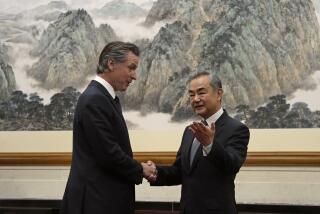CHINA: Baffling Meeting, Wrong Message : Policy: Sending Brent Scowcroft to China was a George Bush blunder based on outdated attitudes toward Asia.
- Share via
SAN DIEGO — The news that National Security Adviser Brent Scowcroft and Deputy Secretary of State Lawrence S. Eagleburger went to China last weekend to “normalize” relations after the Tian An Men massacre is both baffling and appalling.
Do U.S. leaders really believe that we have more in common with a repressive, corrupt China than with a disarming and reforming Soviet Union? Perhaps they are merely sentimental for the days when Richard M. Nixon, Henry A. Kissinger and George Bush were courting Mao Tse-tung in the Forbidden City? Or when Henry Kissinger Associates treated Deng Xiaoping like a client. Given the news from Europe, their timing could not have been worse.
The year 1989 not only marks the 200th anniversary of the French Revolution; in future centuries it may be celebrated as a new watershed in revolutionary behavior. A general crisis of communism engulfed the Marxist-Leninist states. The problem of attempting to reform failed economic systems overtaxed the gerontocratic remnants of politburos in most communist systems and left them with the options of either repression or a sharing of power. Yet the Western World, faced with the loss of legitimacy among its communist adversaries, seems capable of only bumbling, embarrassed responses.
During 1989, de facto insurrections occurred in every communist capital except those ruled by family dynasties, but the least imaginative reaction occurred in China. Until June, China had been in the forefront of reform--or at least so its devotees and sycophants in the United States wanted to believe. Yet even before Solidarity in Poland and well before Mikhail S. Gorbachev came to power in the Soviet Union in 1985, China had begun to ponder a few realities of its so-called revolution.
Communism, of course, aims not at economic efficiency but at social justice. But in the modern world, particularly after the advent of the information-based, electronics-driven industrial structure, state-owned and -controlled enterprises cannot operate efficiently enough to finance a modern welfare system. For communism to try distributing benefits equitably, there must be some benefits. By the late 1970s it had become apparent to virtually all Chinese that Mao’s 27 years in power had produced noting more than that: 27 years of personal dictatorship. The system had run out of benefits.
Dictatorship was the second problem. The communist revolutions of the 20th Century differed from the English revolution of the 17th Century or the French Revolution of the 18th Century in that they did not culminate in “Thermidor.” By Thermidor, students of revolution mean that stage in the process of revolution when the masses (citizens, people, the alleged beneficiaries of the changes) assert themselves and send the revolutionary vanguards back to their customary occupations as clerks, lawyers and functionaries. Thermidor means that the peoples whose victimization justified the revolution finally decide to take their winnings and call it quits--consolidating the new order and preserving gains.
Where Thermidor does not occur--largely because the masses are too unsophisticated to understand what their vanguards are up to--we see a typical pattern. The vanguards first attempt to force their ideology on the masses--the Reign of Terror in the French Revolution, Stalin’s purges, China’s Great Leap Forward. Then the vanguard dictatorship becomes solidified and makes its rule routine. This latter phase, the sleepy but policed indolence of the Leonid I. Brezhnev years, is typified by massive cynicism and corruption--the world of nomenklatura and dachas in Russia, the East German communist elites’ guarded paradise at Wandlitz, the beach resorts and party stores of China’s party plutocracy.
Deng tried to restart China’s economy without disturbing the dictatorship’s entrenched vanguards. Although the terms had not yet been invented, Deng sought perestroika without glasnost. This was not a particularly unusual project. There are innumerable historical examples of similarly placed monopolists of power who wanted economic modernization without political reform, including those of late Manchu China, czarist Russia and Meiji Japan. It does not work.
Reform of a Soviet-type economy, much like the attempt to achieve an outward orientation among less developed countries, is not a unilinear process. There are different ways to do it, each with different trade-offs. Economic reform certainly must be accompanied by political reform, but that is an inadequate way to put it. What is needed is a set, or critical mass, of reforms together with a clear understanding of what markets do and cannot do for economic systems. This set of reforms seems to include, in no particular order, the equitable distribution of the wealth of an economy, a strong commitment to education, family planning, a pilot agency to guide the economy, the private ownership of property, performance tests for the nation’s households and enterprises--and a relatively autonomous, meritocratic state. Nothing is easy about this process, but as the economic dynamism of the non-communist Pacific reveals, there are many possible forms of political economy other than Marxism-Leninism or Adam Smith’s bedrock capitalism.
China’s particular mix of policies for economic reform was uninspired, to say the least. It was much closer to Manchu China’s (for example, sending students abroad while inviting foreign investors) than, say, to South Korea’s or Taiwan’s. Foreign scholars and leaders of the new China lobby (including Nixon, Bush, and their courtiers) who gushed over Deng should have known better--or else never should have been entrusted with policy-making toward China.
Deng attempted economic reform without political change. But neither he nor his hand-picked managers of reform, Hu Yaobang and Zhao Ziyang, ever touched the privileges of the old communist vanguards; the difference between Deng on the one hand and Hu and Zhao on the other is that the latter came to realize the reforms were not going to work. Instead of studying such nearby functioning states as South Korea and Taiwan, China seemed to have taken Ferdinand E. Marcos’ Philippines as its model.
The proximate cause of the Chinese Communist Party’s loss of legitimacy was near-runaway inflation in 1987-89, spurred in turn by disparities between a vibrant private economy and the depressed state-planned enterprises. Corrupt manipulation of the price differences between the two sectors by Communist officials was the major source of fuel for the inflation. Party officials were able to exploit and thereby subvert economic reform in many ways--as privileged owners and operators of private enterprises, as go-betweens and deal-makers, as preferred borrowers from local and central banks, and by illegally shifting commodities from the planned to the market sector of the economy, pocketing the price difference. According to the Chinese government’s own statistics, 70% of all reported economic crimes during 1987-88 were committed by officials, including members of the People’s Liberation Army.
Corruption extended all the way to the top political leadership, known as the 14 Big Families. These are the families of Deng, President Yang Shangkun, Premier Li Peng, the deposed party leader Zhao, plus heirs and descendants of the old vanguards. Many of the students who gathered in Tian An Men Square came from families of lesser officials or professionals on fixed incomes. Inflation affected them personally and focused their attention on families not troubled by inflation because those families were on the take. Calls for democracy were not so much for institutions of the West as they were for Thermidor--to get the entrenched old vanguards off the backs of the people and to hold public officials accountable.
The 14 Big Families reacted precisely as Marx, Engels and Lenin had predicted such a ruling class would act under similar circumstances: in their own interest. Instead of compromising with the students (and their supporters among teachers, bureaucrats, professionals and journalists) or heeding recent lessons from similar events in Warsaw, Budapest, Manila, Taipei or Seoul, Deng and company used the army. They thereby guaranteed themselves a place in history alongside the likes of Brezhnev, Milos Jakes, Todor Zhivkov and Erich Honecker.
With full international media coverage because of Gorbachev’s visit, Deng at first vacillated, then ordered the tanks and heavy weapons against the unarmed students--and followed up with “big lie” techniques that were easily exposed. Thousands of Chinese students in foreign countries plus concerned citizens of Hong Kong transmitted fax reports of the Tian An Men massacre that had been printed in the Communist Party’s own Hong Kong newspapers. “Truth from fax,” as John Fincher has reported, became a pun on Deng’s 1977 slogan that Chinese should “seek truth from facts.”
In the worldwide 1989 crisis of communism, China behaved worse than any other communist nation and with less excuse. Although ostensibly ruled by professional revolutionaries adept at discerning the laws of historical development, China still managed to bungle every opportunity. Not only did the current leaders provoke the largest insurrection in the history of the regime, but in the process of putting it down they destroyed the military’s reputation within the country even more thoroughly than it had been in the botched 1979 invasion of Vietnam. The reply of the students of Tian An Men was apt: “Only power grows from the barrel of a gun; our cause is democracy.” The next time the students’ cause will not be democracy but anti-communism.
The crisis of communism has also proved to be a crisis of understanding for the non-communist world. The United States in particular, as the other pole of a disappearing bipolar world, faces what was and is its most serious set of challenges since consolidation of the Soviet empire after World War II. What theoretical underpinnings guide the Western world’s understanding of recent events in Marxist-Leninist nations? Are these nations succumbing to economic or political failures, or a combination of both? Is it true, as such diverse thinkers as Francis Fukuyama and Robert Dahl contend, that “our” form of government is becoming the universal norm (hence, the “end of history”)?
Whatever turns out to be the Western response to the collapse of the Soviet empire as a whole, the U.S. response to China has been odious. Also potentially quite dangerous; xenophobic Russian generals may well read into our warm embrace of Deng’s regime a new “encirclement” strategy aimed at the Soviet Union.
In fact, U.S. policy in the Pacific is bankrupt: unwilling to stand up for the Tibetans and the citizens of Hong Kong, at least to the extent that it did for the Afghans; still allied with China in support of the genocidal Khmer Rouge; maintaining an army in South Korea poised to defend a nation at least twice as large and infinitely richer than its only opponent; continuing to defend the world’s richest nation, Japan, while simultaneously going deeply into debt, and apparently more concerned about the security of Australia and New Zealand than the more populous and harder working Taiwan.
Such policies grow out of an array of anachronistic treaties and relationships dating from World War II and the Korean War. What the West desperately needs is not a patching up of old policy but a new, fresh look at developments in the communist world, particularly in Asia. One contribution of the Chinese student martyrs may have been to make this latent situation manifest to concerned citizens of the United States and other countries. They may also remind us, in years to come, that the Bush Administration reconciliation with post-Tian An Men China resembles nothing so much as Neville Chamberlain’s visit to Hitler at Munich.
More to Read
Sign up for Essential California
The most important California stories and recommendations in your inbox every morning.
You may occasionally receive promotional content from the Los Angeles Times.










